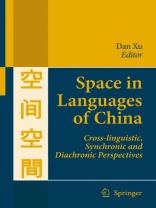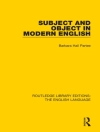Space has long been a popular topic in linguistic research. Numerous books on the subject have been published over the past decade. However, none of these books were based on linguistic data from Chinese and expressions of space in Chinese have been largely neglected in past research.
In this volume, not only Mandarin Chinese (the standard language) is investigated; several other dialects, as well as a minority language of China and Chinese Sign Language are studied. Cross-linguistic, synchronic and diachronic approaches are used to investigate phenomena related to space.
The authors of this book present different points of view on the expression of space in language and related theoretical issues. As the contributing scholars argue, Chinese shares many common features with other languages, but also presents some particular properties.
Space is a topic that is both classical and modern, of enduring interest. These studies of space give insight into not only general linguistics but also other domains such as anthropology and psychology.
表中的内容
Space: A Cross-linguistic perspective.- Introduction: How Chinese Structures Space.- Chinese Localizers: Diachrony and Some Typological Considerations.- Syntax Of Space Across Chinese Dialects: Conspiring and Competing Principles and Factors.- The Linguistic Categorization of Deictic Direction in Chinese — with Reference to Japanese —.- The Locative Words in The Waxiang Dialect Spoken in Guzhang, Hunan.- From Locative to Object Markers: The Parallel Development of Two Postpositions in Bai.- The Role of Visual Space in Sign Language Development.- Space in Synchronic and Diachronic Chinese.- Asymmetry in the Expression of Space in Chinese —The Chinese Language Meets Typology.- Two Conditions and Grammaticalization of the Chinese Locative.- Origin and Evolution of the Locative Term HÒU ‘Back’ In Chinese.- The Inessive Structure in Archaic and Medieval Chinese: An Evolutionary Study of Inessive Demonstrative Uses From Archaic to Early Modern Chinese.
关于作者
Dan Xu is currently Professor of Chinese Linguistics at the Oriental Languages and Civilisations Institute of Paris (INALCO) in France. She graduated with a Ph D in linguistics from the Sorbonne University in Paris in 1987, and completed her Habilitation à Diriger des Recherches from INALCO in 1998. She was elected and served as a Dean of the Chinese Department of the INALCO (2001-2004), and president of the Association of Chinese Research and Teaching in France (AREC, 2002-2004). In 2004 she was elected as a board member of the International Association of Chinese Linguistics.












